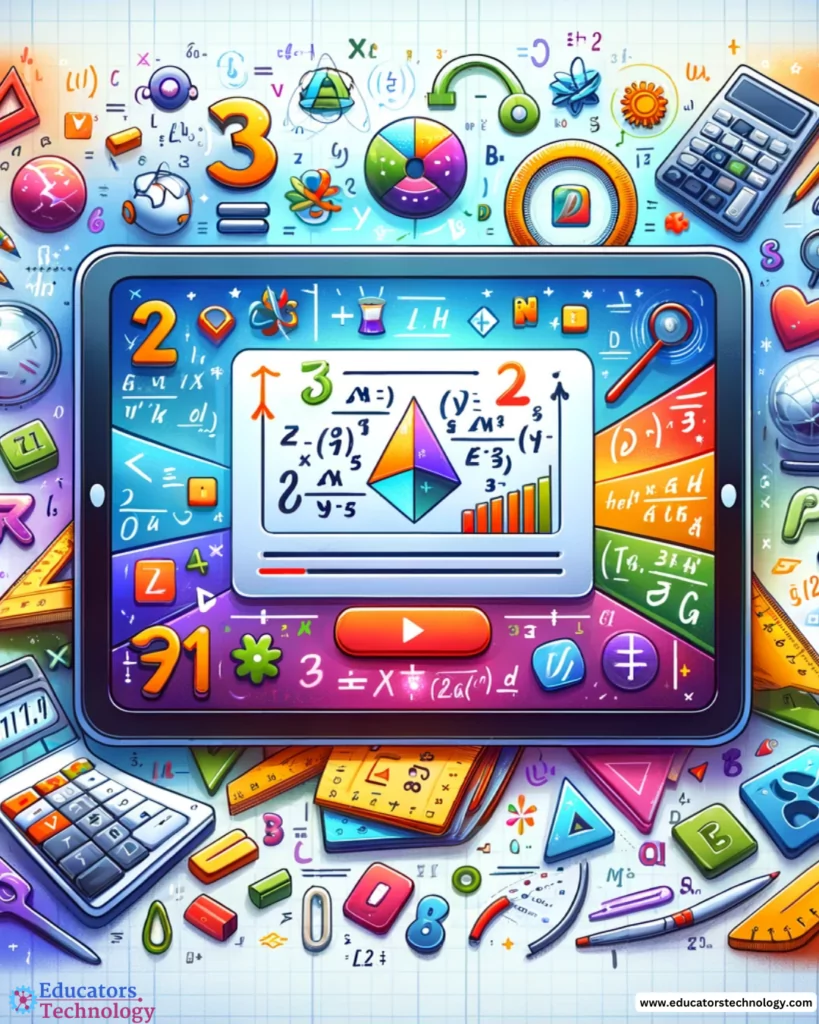In today's blog post, I share with you this selection of mathematics TED Talks that I selected from various TED playlists and that I believe are not only fascinating, but also incredibly valuable for mathematics teachers.

These talks offer unique perspectives on mathematics, combining it with real-world applications, history, art, and even humor. They are excellent tools for mathematics teachers to use in the classroom, either as educational material or as a catalyst for thought-provoking discussions about the nature and importance of mathematics.
Whether you're looking to inspire your students, broaden your horizons, or simply bring a new dimension to your teaching, these talks are sure to enrich your educational toolkit.
For more educational video content, I invite you to check out our TED resources section here on technology Educators. You'll find a wide range of TED videos covering various content areas.
Mathematics TED Talks
Here are math teachers' favorite TED Talks:
1. Teach real math to kids with computersConrad Wolfram
Conrad Wolfram addresses the issue of disinterest in mathematics among students by challenging the traditional method of teaching mathematics, which focuses heavily on manual calculations. He argues that this approach is not only boring but also largely irrelevant to practical mathematics and real-world applications. Wolfram advocates a radical shift toward teaching mathematics through computer programming, emphasizing that this method aligns more closely with actual mathematical practices and applications in various fields.
2. The mathematics of history.Jean-Baptiste Michel
In his talk, TED Fellow Jean-Baptiste Michel opens a fascinating window into what mathematics can reveal about history. By digitizing historical data, Michel demonstrates how mathematical analysis can uncover surprising patterns in various aspects of human history, from the evolution of language to the intensity and impact of wars. His approach shows the potential of mathematics to provide deep insights into our past.
3. How algorithms shape our worldKevin Slavin
Kevin Slavin delves into the pervasive and often invisible influence of algorithms on our daily lives. From stock market fluctuations to spying strategies, and even the selection of movies we watch, he illustrates how algorithms make critical decisions on our behalf. Slavin raises important questions about our dependence on these complex systems and the point at which we might lose control over them, highlighting the profound impact of algorithms in shaping our world.
4. The beautiful mathematics of coralMargaret Wertheim
Margaret Wertheim presents a unique intersection of mathematics, marine biology, and art in her project recreating coral reef organisms using crochet. This project not only celebrates the beauty of coral reefs but also serves as a vivid exploration of hyperbolic geometry, a type of geometry that underlies the structure of corals. Wertheim's work beautifully demonstrates how mathematics can be found and represented visually in natural phenomena.
5. The mathematics of warSean Gourley
Sean Gourley offers a compelling analysis of modern conflict through the lens of mathematics. Examining data from the Iraq War and other conflicts, Gourley and his team discovered a surprisingly consistent mathematical relationship between the frequency and severity of violent incidents. This discovery not only provides new insights into the nature of war, but also shows the power of mathematical analysis to understand complex human activities.
6. The magic of Fibonacci numbersArturo Benjamin
Arthur Benjamin, also known as the “Mathemagus”, brings to life the fascinating world of the Fibonacci series in this engaging talk. He explores the fascinating properties of this famous sequence of numbers and demonstrates how they appear unexpectedly in various aspects of nature, art, and life. Benjamin's presentation is a reminder of the beauty and inspiration that mathematics, often perceived as purely logical and functional, can offer.
Related: Top TED Talks on STEAM Education
7. The surprising mathematics of cities and corporationsGeoffrey West
Geoffrey West, a physicist, discovers fascinating mathematical laws that dictate the dynamics of cities and corporations. He illustrates how a number of urban attributes, such as wealth, crime rates, and even pedestrian speed, can be predicted from a single metric: the city's population. West extends this concept to explain similar patterns in biological organisms and corporate structures, offering a thought-provoking perspective on the fundamental mathematical principles that underpin complex systems.
8. Fractals at the heart of African designsRon Eglash
Ron Eglash introduces the public to the striking presence of fractal patterns in the layout and designs of African villages. His journey, which begins with a unique rooftop greeting, leads to the discovery of intricate fractal patterns rooted in various African cultural practices. Eglash's exploration bridges mathematics and anthropology, revealing the sophisticated mathematical concepts embedded in traditional African designs.
9. Mathematics and the magic of origamiRobert Lang
Robert Lang, origami artist and engineer, shows the surprising fusion of mathematics and art in the world of modern origami. He demonstrates how mathematical principles can be applied to create incredibly complex and detailed origami sculptures. Lang's work not only pushes the boundaries of this ancient art form, but also highlights its potential applications in real-world design and engineering problems.


10. Why I fell in love with monstrous prime numbersAdam Spencer
Comedian and math enthusiast Adam Spencer shares his fascination with “monster” primes, extraordinarily long numbers that are only divisible by themselves and one. His talk is a journey into the world of these massive numbers, exploring the challenges and excitement of discovering new prime numbers. Spencer's enthusiasm and humor make a seemingly esoteric topic accessible and engaging, revealing the captivating nature of mathematical exploration.
eleven. Comics that ask “what if?”Randall Munroe
Randall Munroe, known for his webcomic “xkcd,” delves into the fun and imaginative side of math and science. He answers strange and whimsical “What if?” questions using math, physics, and a healthy dose of humor. Munroe's talk is a journey through the creative and often absurd hypothetical scenarios he explores in his comics, showing how these fanciful musings can lead to surprising and enlightening ideas.
Related: 10 fantastic TED talks about autism
Final thoughts
In conclusion, these TED Talks represent a treasure trove of ideas and inspirations for anyone passionate about mathematics education. The speakers at these talks, through their unique lenses and engaging narratives, give us extraordinary tools to do just that. Whether you're using these talks to spark lively classroom discussion, to supplement your curriculum, or to offer your students an insight into the vast and varied world of mathematics, they are sure to leave a lasting impact.






